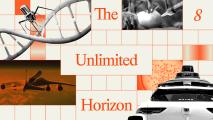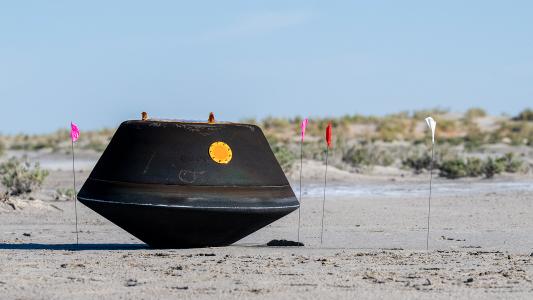Unlike the lab-grown diamonds that customers receive from Eterneva, the idea for the business did not come fully formed. It started as a simple curiosity. Eterneva founder & CEO Adelle Archer had been interested in the technology behind lab-grown diamonds — which are identical in quality to mined diamonds but don’t harm the environment or result in unethical labor practices — but she didn’t see a clear opportunity to create a business.
A personal tragedy changed that. After the death of one of her friends, Archer realized that few businesses offered thoughtful and meaningful ways for people to celebrate and memorialize loved ones who have passed away. She eventually landed on the model of Eterneva, which uses the carbon within people’s ashes or hair to produce diamonds in the lab that serve as memorials.
Watch the full video on Eterneva:
For Archer, using her interest in lab-grown diamonds to improve end-of-life care ended up being not only profitable and scalable, but also meaningful on a personal level.
“When supporting somebody through a difficult time came together with a really good business model, it was really special,” Archer told Freethink. “It was one of those moments that I was actually able to say with certainty ‘This is what I’m meant to be working on, this is my calling.’”
Recognizing opportunity
While lab-grown diamonds have existed since the 1950s, it was only in the last decade that diamonds could be grown identical in quality to mined diamonds. In 2018, the Federal Trade Commission ruled that lab-grown diamonds can be classified as real diamonds, defining a diamond as “a mineral consisting essentially of pure carbon crystalized in the isometric system.”
As the most well-known gem, famous for its extravagance and beauty, the idea of growing diamonds in a lab presented a chance to disrupt the diamond market. The diamond mining industry is infamous for its high prices and “blood diamonds” (diamonds mined in war zones used to finance conflict).
“I knew that this was something positive for the environment,” Archer told Freethink. “It was good for labor standards knowing that you know where the diamond came from, it wasn’t a blood diamond.”
Recognizing opportunity in the lab-grown diamond and end-of-life care industries, the idea for Eterneva began to emerge.
“Perhaps, we could marry this technology we found really interesting with a gap in a market — and that is actually how we landed on the memorial diamond,” Archer said.
The model is proving successful. In 2021, Eterneva scored a $10 million funding round from multiple investors, including billionaire Mark Cuban. One factor behind the company’s success is that Eterneva isn’t just another lab-grown diamond vendor. The first (and obvious) reason is that the company derives the diamond’s carbon element from the ashes or hair of people (Eterneva also offers memorial diamonds from the remains of pets).
But Eterneva also makes a point to involve customers in the production process, encouraging them to write a custom inscription on the diamond, choose its color, and receive regular updates on the production of the diamond, which can take up to 12 months.
Archer said that this kind of personalization and celebration was missing in end-of-life care.
“What’s special about it is we create a whole special celebration experience around the diamond creation process, and just give people an outlet to celebrate their person on an ongoing basis, and have something positive to look forward to.”
Utilizing an opportunity framework
While recognizing the opportunities behind Eterneva was one thing, fusing them into a successful business was another. To make an informed decision, Archer turned to using an opportunity framework.
At its core, an opportunity framework is a business planning method that involves asking questions and answering them across a few key categories. There are a number of opportunity frameworks designed for different types of businesses and applications, but they all feature the following ideas:
- Identifying the opportunity itself: what is unique about the business?
- Recognizing customer needs and wants: is there a desire for the product or service and how much?
- Understanding market conditions and competition: how difficult is it to enter the market?
- Planning a strategy that incorporates all of the above with how to finance the business, who to hire, and put on a timeline.
Considering all of these steps and questions should make it more clear whether a business idea is likely to be profitable and scalable over the long term. After all, startup businesses are notorious for their short life spans. The business analytics firm CBInsights identified some of the top reasons:
- 38% ran out of cash/failed to raise new capital
- 35% no market need
- 20% got outcompeted
- 19% flawed business model
- 18% regulatory/legal challenges
The report goes through each reason and provides real-world examples of startups failing, the trend being that things change over time and businesses need to adapt. A well-constructed and adaptable opportunity framework could have accounted for these reasons. However, as markets change, a successful startup will need to continue analyzing and reworking their opportunity framework to stay relevant.
That is no easy task. The overall failure rate of startups is 90% within five years, as reported by policy advisory and research firm Startup Genome in their Global Startup Ecosystem Report 2022.
Utilizing an opportunity framework is a solid way for entrepreneurs to stay on the right side of those statistics by helping to determine whether business opportunities are sound enough to pursue in the first place. And as for finding opportunities, Archer offered one last bit of advice: Asking the right questions is more important than having the right answers.
“You want to be thinking through things and asking yourself questions,” Archer told Freethink. “It’s not about having the right answer — the question is more important.”






